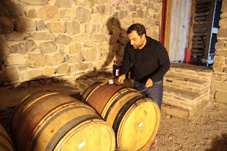37-year-old winemaker's innovative methods for agriculture
By Tsotne Pataraia
Thursday, September 19


The company's activities are distinguished by the fact that the entrepreneur produces the vineyard in a biodynamic way, foregoes modern agricultural practices in favor of horse-drawn plows and fertilizers extracted from bark, nettles, and lilies. Aladashvili does not use agrochemicals during vine care. According to him, pesticides damage the vine over time, deprive the wine taste and pollute the soil.
A mode of agricultural production still unknown in the country. "People often think I'm crazy," Giorgi laughs. After working with some biodynamic figures he created Ruispiri Biodynamic Vineyard in 2016.
According to the winemaker, he learned the biodynamic treatment of land in Switzerland. Although Georgians also used this method before, today it has been dragged out by the modern industry.
Since in Kakheti, most Georgian families produce their own wine, Giorgi also inherited this tradition. From 2010 onwards, he has been working with different indigenous grape varieties such as Saperavi (red) or Rkatsiteli (white), but also with grape varieties imported from Switzerland such as Malvasia or Pinot Gris.
The company currently produces several varieties of wines, of which about 75 percent are sold in Switzerland:
“I produce about 7,000 bottles of wine a year. It is bio-certified Saperavi, Kisi, Khikhvi, Kakhuri Green, mixed with old vineyards, fortified wine. All this is sold under the 'Biovinia' brand. I also produce chacha. My wine costs at least 70 euros in Switzerland,” Aladashvili said.
Georgian winemaker thinks that the development of viticulture and winemaking in Georgia has great potential: “As for pitcher wine, it has no competitors in the local or international market. This type of wine is quite in demand in the world,” states Aladashvili.
One of the extra particularities that “Ruispiri Biodynamic Farm” wines have is that they use of Qvevri for the fermentation and aging of wines, firstly because it is in perfect harmony with biodynamic viticulture, then, because Kvevri provides a true identity and character without similar to wines and finally, because it allows perpetuating an ancestral Georgian tradition.
Once very developed in the country, pottery know-how has now virtually disappeared and only a few craftsmen still produce great jars of quality. Since 2013, the Georgian wine making method in traditional Qvevri has been inscribed on the Representative List of the Intangible Cultural Heritage of Humanity. The work in Qvevri is demanding and requires experience. Indeed, once the grapes are pressed and transferred to the jars, it will constantly stir the must and ensure the smooth running of the fermentation.
Georgian ancestral traditions of winemaking go back to 8000 years ago, where the first traces of wine have been recently dated. Each Georgian family produces enough for at least one year of consumption. Underground clay vessels, known as Qvevri, are a crucial part of Georgian wine-making and cultural heritage.
